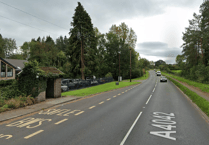Almost hidden among the graves in the churchyard at Llanellen stands a modest, marble memorial surrounded by cast-iron railings writes FRANK OLDING.
It commemorates a man whose achievements are widely ignored and whose name is all but forgotten in the village he made his home for over twenty years.
Sir Thomas Phillips was born at Ynys y Garth - the row of cottages opposite the Clydach Ironworks - in 1801.
As a young man, Thomas entered the legal profession as the articled clerk of Thomas Protheroe of Newport and eventually became his partner and a well-known barrister.
He became very active in local politics and, in 1838, was elected Mayor of Newport.
It was towards the end of his period in office, in November 1839, that the Chartist Uprising and attack on the Westgate Hotel took place. In the bloody battle that followed, twenty two people were killed and many more wounded. Thomas Phillips was among them - with a Chartist musket ball in the arm.
He later received a knighthood for his part in repelling the Chartist attack. In about 1840 he moved to Llanellen House where he lived until his death in 1867.
However, it is not for his opposition to the Chartists that Thomas Phillips was hailed as a national hero, but for his passionate defence of the Welsh people and language against the obnoxious slanders of the infamous "Blue Books".
The "Blue Books" (published in 1847) were the official reports of a government enquiry into the state of education in Wales.
With the specific aim of enquiring "into the means afforded to the labouring classes of acquiring a knowledge of the English tongue", the government sent three lawyers named Lingen, Symons, and Johnson to conduct the survey.
All three were Anglicans, none of them had any specialist knowledge of education and none could speak Welsh, yet they were being sent to investigate the state of education in a country that was still mainly Nonconformist and overwhelmingly Welsh-speaking (services at Llanellen church were conducted in Welsh until 1877).
In their very thorough report they lamented the scarcity and the deplorable condition of schools.
They were also highly critical of the teaching methods and harsh discipline used in those that did exist and deplored the inability of the staff to teach English to monoglot Welsh children.
In these conclusions they were far from wide of the mark, but the reasons offered for this sorry state of affairs amounted to a cruel slander.
They reported that the Welsh as a nation were dirty, lazy, ignorant, superstitious, deceitful, promiscuous and immoral.
With regard to the young women of Wales, they reported "that so far from wondering that they are universally unchaste, the wonder would be if they were otherwise." They blamed all of these evils on Nonconformity and the Welsh language.
They saw Welsh as, "a vast drawback to Wales, and a manifold barrier to the progress and commercial prosperity of the people. It is not easy to over estimate its evil effects . . . There is no Welsh literature worthy of the name."
The solution to all of Wales’ problems was the eradication of Welsh and the encouragement of the English language, "it would extend the influence and power of the established church . . . consequent upon this would be the general improvement of the people in due deference to their superiors and respect for the law of the land..."
Sir Thomas Phillips was appalled by the aspersions cast on the Welsh nation by the "Blue Books", he set about collecting material to refute their horrendous accusations.
As he himself said, "Born in the Principality, speaking its language, and accustomed from my earliest years to associate with its inhabitants, I might claim to speak with the authority of a witness...”
The result of his campaign was a masterly book entitled Wales, the Language, Social Condition, Moral Character, and Religious Opinions of the People which he published in 1849 and which is still his chief claim to fame.
In his book, Sir Thomas showed the accusations of the "Blue Books" for the lies that they were, "imputations upon moral character, especially such as affect the reputation of the women of a whole district, demand a rigid enquiry and a prompt refutation . . . It is the admission of men, who have travelled far and seen much, that in no country have they found women of greater gentleness and interest than the pleasant girls of Wales;"
His defence of the Welsh nation was eloquent and fearless.
“These descriptions (penned by English writers, devoured by English readers, and countenanced by English rulers) are circulated . . . of a people amongst whom Englishmen dwell, with whom they associate and intermarry, and from whom many of the nobles of England are descended: a people distinguished by their courteous bearing, by their hospitality to strangers, and by preserving unimpaired many of the virtues which characterize a primitive life; who in war have fought on the same battle-field with Englishmen; and in peace have borne an equal share of the burdens of state; who have been characterized in every period of their history by devoted loyalty; and who . . . upheld their country’s glory."
Sir Thomas also proposed many practical ways to improve education in Wales. He suggested that the best way of teaching the Welsh to speak English was by education through the medium of the Welsh language itself.
He also argued that if children were taught to read English only, "their minds can rarely be influenced, nor can much knowledge be given them, in the limited period over which their school instruction extends;"
Welsh people everywhere, whichever language they speak, owe a huge debt of gratitude to Sir Thomas Phillips for his spirited defence of their national character and reputation. His memory deserves to honoured and preserved.
Sir Thomas Phillips – Arwr Cymraeg
Yr oedd canol y 19eg ganrif yn gyfnod anodd a thrawmatig i garedigion y Gymraeg. Cododd llawer i gachgi ac ambell i arwr o blith y Cymry - rhai ohonynt yn bur annisgwyl ar y ddwy ochr! Dyma hanes un o’r arwyr prin.
Ganed Thomas Phillips (1801-1867) yn Ynys y Garth - y rhes o fythynnod bychain gyferbyn â Gwaith Haearn Clydach, Sir Frycheiniog - ym 1801. Yn fargyfreithiwr wrth ei broffes, daeth yn weithgar iawn mewn gwleidyddiaeth leol ac ym 1838 fe’i hetholwyd yn faer Cas Newydd. Tua diwedd ei gyfnod yn y barchus arswydus swydd honno, ym mis Tachwedd 1839, cododd Siartwyr y sir mewn gwrthryfel o dan arweinyddiaeth John Frost o Gas Newydd a Zepheniah Williams o Nantyglo ac ymosod ar Westy’r Westgate yn y dref. Yn y frwydr a ganlynodd, lladdwyd dau ar hugain ac anafwyd llaweroedd mwy. Yr oedd Thomas Phillips yn eu plith - gyda bwled un o’r Siartwyr yn ddwfn yn ei fraich. Yn ddiweddarach cafodd ei urddo’n farchog am wrthsefyll "brad" ei gyd-Gymry. Oddeutu 1840, symudodd i Dy Llanelen i fyw ac yno y trigodd hyd at ei farwolaeth ym 1867.
Ar yr olwg gyntaf felly, nid Thomas Phillips oedd y gwr mwyaf tebygol o fod yn bleidiwr tanbaid dros y werin a’r Gymraeg. Ond felly y bu. Yr hyn a’i cynhyrfodd, wrth gwrs, oedd cableddau digywilydd y Llyfrau Gleision - adroddiad swyddogol ymchwiliad y llywodraeth i gyflwr addysg yng Nghymru ac "into the means afforded to the labouring classes of acquiring a knowledge of the English tongue".
Er bod cynnwys y Llyfrau Gleision bron yn ystrydebol erbyn hyn ac er ymdrechion rhai haneswyr i fychanu eu heffaith ar seicoleg dorfol y Cymry, fe dâl inni gofio holl atgasedd noeth a dirmyg eu sylwadau. Yn ôl y rhai a luniodd yr adroddiad, yr oedd y Cymry fel cenedl, yn frwnt, diog, anwybodus, ofergoelus, anfoesol ac yn anllad o anniwair. Ynglyn â merched Cymru, yr oeddynt yn fwy hallt byth: “that so far from wondering that they are universally unchaste, the wonder would be if they were otherwise.
Ar Anghydffurfiaeth a’r Gymraeg yr oedd y bai am hyn i gyd wrth gwrs. Nid oedd y Gymraeg yn fwy nag, “a vast drawback to Wales, and a manifold barrier to the progress and commercial prosperity of the people. It is not easy to over estimate its evil effects . . . There is no Welsh literature worthy of the name.”
Yr ateb oedd diddymu’r Gymraeg yn llwyr a hybu’r iaith fain, ‘it would extend the influence and power of the established church . . . consequent upon this would be the general improvement of the people in due deference to their superiors and respect for the law of the land...’
Gwylltiodd Sir Thomas Phillips rhag ofnadwyaeth y cableddau ar y genedl ac aeth ati i gasglu deunydd i ’w gwrthbrofi. Fel y dywaid ei hunan, “Born in the Principality, speaking its language, and accustomed from my earliest years to associate with its inhabitants, I might claim to speak with the authority of a witness...”
Ffrwyth ei ymdrech oedd ei gyfrol gynhwysfawr Wales, the Language, Social Condition, Moral Character, and Religious Opinions of the People a gyhoeddwyd ym 1849. Ynddi, tynnodd Thomas Phillips sylw’r byd i holl annhegwch a chelwyddau’r Llyfrau Gleision, ‘imputations upon moral character, especially such as affect the reputation of the women of a whole district, demand a rigid enquiry and a prompt refutation . . . It is the admission of men, who have travelled far and seen much, that in no country have they found women of greater gentleness and interest than the pleasant girls of Wales.’
Amddiffynnodd ei gyd-Gymry yn ddewr ddi-flewyn ar dafod - yn ei fodd Brydeinllyd ei hun, wrth gwrs, “These descriptions (penned by English writers, devoured by English readers, and countenanced by English rulers) are circulated . . . of a people amongst whom Englishmen dwell, with whom they associate and intermarry, and from whom many of the nobles of England are descended: a people distinguished by their courteous bearing, by their hospitality to strangers, and by preserving unimpaired many of the virtues which characterize a primitive life; who in war have fought on the same battle-field with Englishmen; and in peace have borne an equal share of the burdens of state; who have been characterized in every period of their history by devoted loyalty; and who . . . upheld their country’s glory.”
Cynigiodd hefyd ffyrdd ymarferol i wella cyflwr addysg yng Nghymru. Awgrymodd yn ddigon call mai’r ffordd orau o gael plant Cymraeg i siarad Saesneg oedd addysg trwy gyfrwng y Gymraeg ei hun. Gwagedd o wagedd oedd eu dysgu i ddarllen Saesneg yn unig, ‘their minds can rarely be influenced, nor can much knowledge be given them, in the limited period over which their school instruction extends.’
Yr oedd Sir Thomas Phillips yn benderfynol o amddiffyn cymeriad ac enw da’r Cymry fel cenedl. Dylid cofio cyn lleied o bobl eraill o gyffelyb gefndir a ymdrafferthodd o gwbl. Brân wen oedd Phillips ymhlith ei gyd-gyfoethogion yng Ngwent ac yng Nghymru benbaladr. Gellid anwybyddu dicter y Cymry uniaith, felly rhaid oedd protestio yn yr iaith swyddogol, yn iaith y cableddwyr eu hunain. Dyna a wnaeth Thomas Phillips ac, er mor ofer yr ymdrech, dylem gofio ein dyled iddo.





Comments
This article has no comments yet. Be the first to leave a comment.